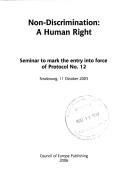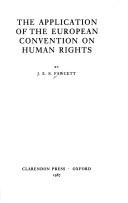| Listing 1 - 10 of 434 | << page >> |
Sort by
|
Book
ISBN: 9287189633 Year: 2019 Publisher: Strasbourg : Conseil de l'Europe,
Abstract | Keywords | Export | Availability | Bookmark
 Loading...
Loading...Choose an application
- Reference Manager
- EndNote
- RefWorks (Direct export to RefWorks)
Book
Year: 1962 Publisher: : Strasburgo,
Abstract | Keywords | Export | Availability | Bookmark
 Loading...
Loading...Choose an application
- Reference Manager
- EndNote
- RefWorks (Direct export to RefWorks)
Book
ISBN: 9789287162168 9287162166 Year: 2008 Publisher: [s.l.] : Council of Europe
Abstract | Keywords | Export | Availability | Bookmark
 Loading...
Loading...Choose an application
- Reference Manager
- EndNote
- RefWorks (Direct export to RefWorks)

ISBN: 9287159262 9789287159267 Year: 2006 Publisher: Strasbourg: Council of Europe,
Abstract | Keywords | Export | Availability | Bookmark
 Loading...
Loading...Choose an application
- Reference Manager
- EndNote
- RefWorks (Direct export to RefWorks)
Proceedings of a seminar organised by the Council of Europe in Strasbourg on 11 October 2005, to mark the entry into force of Protocol no. 12 to the European Convention on Human Rights. Its aim was to examine the challenges to the effective application of this Protocol - which sets out a general prohibition of discrimination - with a view to promoting further ratifications by member states of the Council of Europe. The topics were the scope of Protocol no. 12 and how to prepare ratification in practice.

ISBN: 0198255101 Year: 1987 Publisher: Oxford, UK : Clarendon Press,
Abstract | Keywords | Export | Availability | Bookmark
 Loading...
Loading...Choose an application
- Reference Manager
- EndNote
- RefWorks (Direct export to RefWorks)
Book
ISBN: 1780688040 9781780688046 9781780686837 1780686838 Year: 2018 Publisher: Cambridge : Intersentia,
Abstract | Keywords | Export | Availability | Bookmark
 Loading...
Loading...Choose an application
- Reference Manager
- EndNote
- RefWorks (Direct export to RefWorks)
Tort law and human rights belong to different areas of law, namely private and public law. Nevertheless, the European Convention on Human Rights increasingly influences national tort law of signatory states, both on the vertical level of state liability and on the horizontal level between private persons. An individual can appeal to the European Convention on Human Rights in order to challenge national tort law in two situations: where he is held accountable under national tort law for exercising his Conventions rights, and where national law does not provide effective compensation in accordance with Article 13. The second method is strongly connected with the practice of the European Court of Human Rights to award compensations itself on the basis of Article 41. A compensation in national tort law is considered to be effective according to Article 13 when it is comparatively in line with the compensations of the European Court of Human Rights granted on the basis of Article 41. This raises the important question as to how compensations under Article 41 are made by the European Court of Human Rights. The European Convention on Human Rights as an Instrument of Tort Law examines the entanglement of public and private and national and transnational law in detail and argues that while the Court uses a different terminology, it applies principles that are very similar to those of national tort law and that the Court has developed a compensatory practice that can be described as a tort law system. Stefan Somers is a professor at the Free University of Brussels (VUB) where he lectures on the law of obligations. He is also a trainee judge and prosecutor at the Court of First Instance and the Commercial Court, Antwerp.
Book
ISBN: 9780198862000 0198862008 Year: 2023 Publisher: Oxford, United Kingdom : Oxford University Press,
Abstract | Keywords | Export | Availability | Bookmark
 Loading...
Loading...Choose an application
- Reference Manager
- EndNote
- RefWorks (Direct export to RefWorks)
Now in its fifth edition, Harris, O'Boyle, and Warbrick: Law of the European Convention on Human Rights remains an indispensable resource for undergraduates, postgraduates, and practitioners alike.The new edition builds on the strengths of previous editions, providing an up-to-date, clear, and comprehensive account of Strasbourg case law and its underlying principles. It sets out and critically analyses each Convention article (including those addressed by relevant Protocols), and thoroughly examines the system of supervision. The book also addresses the pressures and challenges facing the Strasbourg system in the twenty-first century.
Book
ISBN: 375600287X 9783756002870 Year: 2023 Publisher: München Beck
Abstract | Keywords | Export | Availability | Bookmark
 Loading...
Loading...Choose an application
- Reference Manager
- EndNote
- RefWorks (Direct export to RefWorks)
Book
ISBN: 9780414042421 Year: 2011 Publisher: London : Sweet & Maxwell,
Abstract | Keywords | Export | Availability | Bookmark
 Loading...
Loading...Choose an application
- Reference Manager
- EndNote
- RefWorks (Direct export to RefWorks)
Book
ISBN: 9781137607317 Year: 2018 Publisher: Basingstoke, Hampshire : Palgrave Macmillan,
Abstract | Keywords | Export | Availability | Bookmark
 Loading...
Loading...Choose an application
- Reference Manager
- EndNote
- RefWorks (Direct export to RefWorks)
| Listing 1 - 10 of 434 | << page >> |
Sort by
|

 Search
Search Feedback
Feedback About UniCat
About UniCat  Help
Help News
News